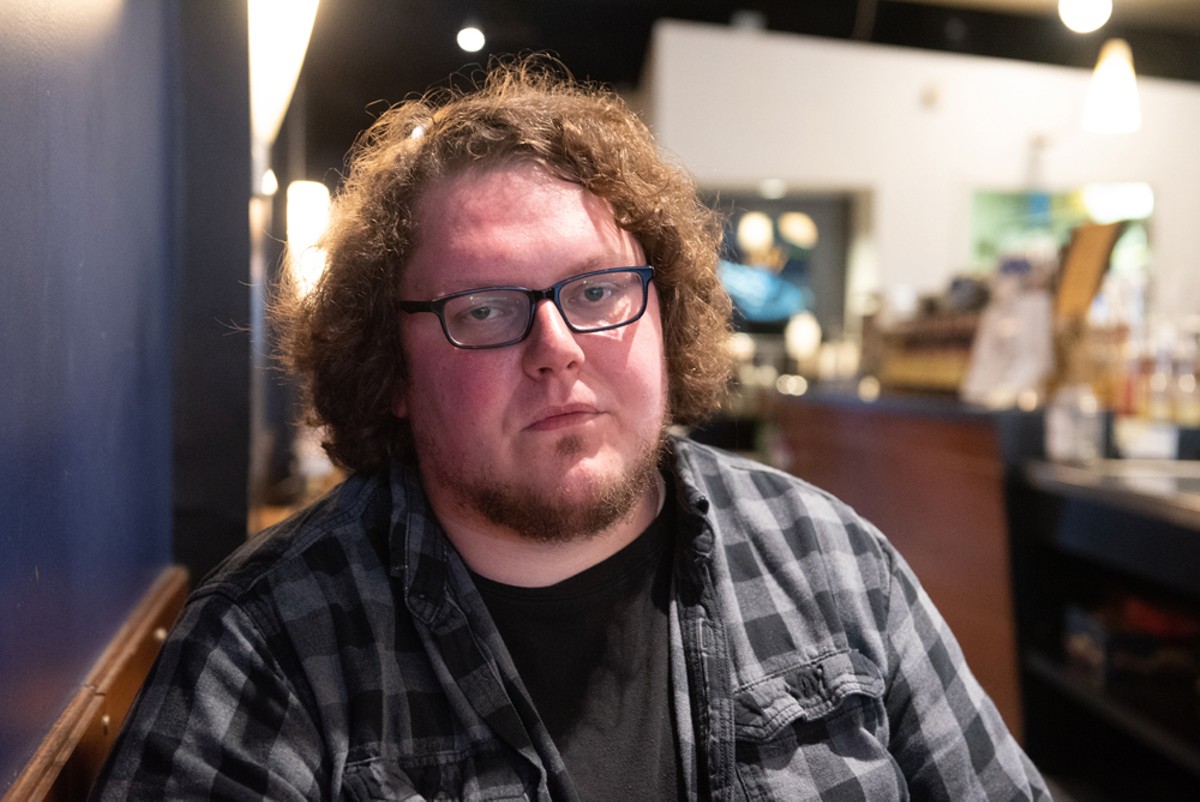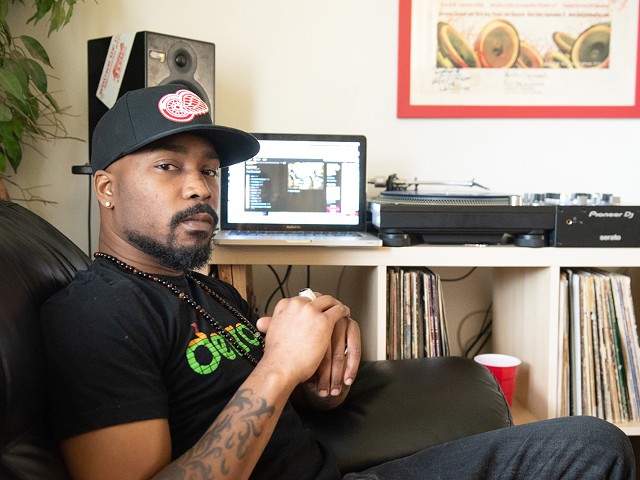On a gloomy rainy April night at Ferndale's Java Hutt, rapper Chris Orrick is dressed in a gray button-down shirt and jeans, sitting at a two-seater table nursing a mug of peppermint tea. Orrick hasn't lived in Ferndale since 2015, and just like Java Hutt, he's more "old Ferndale" than the new "don't Royal Oak my Ferndale" version.
Orrick, 32, is an "everyman" emcee, his tracks covering depression, substance abuse, surviving family drama, and living paycheck to paycheck. He's a Michigan kid, having lived in Redford for half his childhood and is very nostalgic when speaking on his old stomping grounds. "My dad grew up in Redford, his family moved there after white flight," he says between sips of tea. "It was more diverse for me, and I had cool group of friends. I was one of the kids that didn't have as much money, but it was nothing out the ordinary."
In 2001, when Orrick was 13, his family moved to Howell after a family disagreement. Unlike Redford, Howell was predominantly white and more than an hour away from Detroit. The initial lack of friends and uncomfortableness of being in a new town forced Orrick to dig inside himself for solace.
"The first year I was there, it was like I didn't want to be there," he says. "I wanted to go back to my friends. I started to fall into music and I started writing. I started writing raps; they had no form to them whatsoever."
But what Howell lacked in racial diversity, it made up for in its medley of music scenes. As Orrick began to slowly climb out of his shell, he realized that Howell had a teenage punk rock scene, a garage rock scene, and a hip-hop scene, in which he would take by the horns. "I was one of the only people making hip-hop," he says. "I would play these shows at these little rec centers with punk rock bands and shit like that. I would be the rapper on the bill. I learned how to perform."
Orrick graduated from high school in 2006, spent a year at Eastern Michigan and then transferred to Michigan State University, where he pursued hip-hop just as hard as he did his political science degree. "I lived in an apartment in Lansing," he says. "Dudes from Detroit had moved in, started smoking weed. One of them was making trap music beats on Fruity Loops [studio software]. Dude would spend hours showing me the ropes."
Orrick was also accepted into a talented Lansing scene of hip-hop that included Jahshua Smith, James Gardin, and Ozay Moore. In 2010, while still a college student, he self-released his debut project, Please Tip the Driver, under his Red Pill moniker (a name he retired in 2018). On it, Orrick spit raw lyrics over backpack samples about his rap come-up and family issues. The record got him on college radio stations, Detroit stages, and blog sites. He essentially knocked the ball out the park on the first pitch.
Orrick dropped more of the same in his 2012 album, Dream Within a Dream, and a chance meeting with producer Apollo Brown changed his musical fortunes. "I met Apollo Brown at a beat battle in Lansing," he says. "I gave him a copy of Please Tip the Driver and one thing led to another." Brown, from Detroit, had made a name for himself for stellar production work with Mellow Music Group and would be the bridge that ledto Orrick joining Mello Music Group in 2014 and the formation of the hip-hop trio Ugly Heroes, featuring Orrick, Brown, and Verbal Kent. Orrick's 2015 debut solo album on Mello, Look What You Did to Us, outperformed expectations, was critically acclaimed, and solidified Orrick as formidable emcee.
The album was relatable, personal, and observational, officially establishing Orrick's "everyman" persona. "It was sort of a lane that felt comfortable to me, kind of what I write about is more of the day to day, less the flash, and more of the realities that most of us face growing up around here," he says. "We're not trapping, but we're not rich, so we're in the middle. I write from a simple perspective. I'm not a big metaphor guy — I write plainly and say things in a plain way that you've never heard before."
In 2016 Orrick fell into a bit of a sophomore slump with his album Instinctive Drowning, a commercial and critical flop. "I thought it was the record that was going to be 'it' for me," he says. "It was an underground album that was solidly there; like I know can sell. I had just gotten off a tour with Murs. I was lining up two new tours. All this work I'd been putting in was about to snowball."
But the album received a subpar review from Pitchfork and two upcoming tours were postponed. "It was a really tough moment for me," he says. "It felt like a steamroll was happening, but it's given me perspective."
Orrick rebounded hard in 2018 with Portraits, an album that explored insecurities, depression, and his vendetta against the world over melodic and boom-bap beats. The album restored his confidence and has led to his latest record, Out to Sea. The eponymous first single was released in April, with lyrics about feeling mentally disconnected from the world and a video featuring Orrick roaming aimless over beaches and navigating a boat to nowhere.
The album's eight tracks cover the gamut of Orrick's usual themes. "Funny Things" is an introspective look at America's awkward political climate, while Orrick searches for inner clarity in "Spent A Lot of Time." The production of the album leans toward the upbeat jazzy side; "Out to Sea" feels a tad more livelier than Orrick's previous offerings. His approach of dealing with tough personal issues has maintained, however.
Even with Out to Sea about to drop on May 24, Orrick is already thinking about the next album. "You got to keep moving, you got to keep pushing," he says. "As much as I could complain or as much as I can wish certain things went certain ways, it's what I love and I'm going to keep doing it."
Orrick's musical persona and transparency aren't ust a gimmicks but represented in his life as well. Although he makes the majority of his income from music, he also works with his dad in a delivery business. "My dad delivers to coneys," he says. "I work a few days a week for him. Most of the money I make is from music, but working with him is something I value more and more as I get older."
When asked where he sees himself 10 years from now, Orrick is optimistic at best. "I live in the moment," he says. "At 31 it's different. Twenty-year-old Chris would have answered by saying, 'I want to be on tour,' but 31 year-old Chris is like, 'I need to own a home eventually.' I don't need to make a lot of money; that's never been a goal of making a ton. If I could be able to keep making music, be comfortable, and have a little extra, maybe then I'll be good."
Stay on top of Detroit news and views. Sign up for our weekly issue newsletter delivered each Wednesday.







